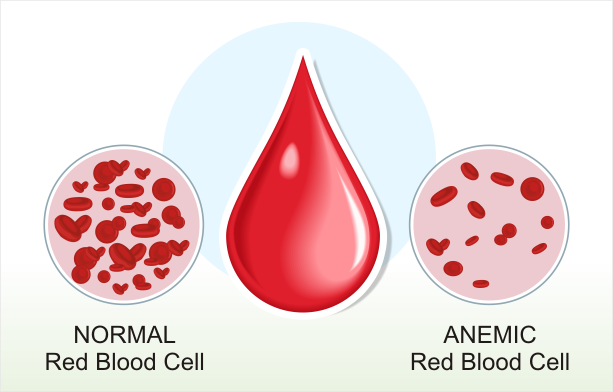anemia
A condition in which the blood doesn’t have enough healthy red blood cells. Anemia results from a lack of red blood cells or dysfunctional red blood cells in the body. This leads to reduced oxygen flow to the body’s organs. Symptoms may include fatigue, skin pallor, shortness of breath, lightheadedness, dizziness, or a fast heartbeat. Treatment depends on the underlying diagnosis. Iron supplements may be used for iron deficiency. Vitamin B supplements maybe used for low vitamin levels. Blood transfusions may be used for blood loss. Medications to induce blood formation may be used if the body’s blood production is reduced.
FAQ
What causes anemia?
Anemia can be caused by various factors, including nutritional deficiencies (iron, vitamin B12, folic acid), chronic diseases, genetic disorders, bone marrow problems, and certain medications. Iron-deficiency anemia is one of the most common types.
What are the symptoms of anemia?
Common symptoms of anemia include fatigue, weakness, pale or yellowish skin, shortness of breath, dizziness, headache, cold hands and feet, chest pain, and irregular heartbeats. However, symptoms can vary depending on the underlying cause.
How is anemia diagnosed?
Diagnosis typically involves a medical history review, physical examination, and blood tests. These blood tests may include a complete blood count (CBC), iron studies, vitamin B12 levels, and other relevant markers to identify the specific type and cause of anemia.
Can anemia be prevented?
Depending on the cause, anemia may be preventable. Maintaining a balanced diet rich in iron, vitamin B12, and folic acid can help prevent certain types of anemia. Regular medical check-ups and addressing underlying health conditions can also contribute to prevention.
How is anemia treated?
Treatment depends on the underlying cause of anemia. It may involve dietary changes, iron or vitamin supplements, blood transfusions, and managing any contributing health conditions. Treatment is personalized based on the specific type and severity of anemia.
Is anemia a serious condition?
The seriousness of anemia depends on its cause and severity. Mild cases may be managed with dietary changes and supplements, while severe cases may require more aggressive interventions. If left untreated, anemia can lead to complications affecting the heart, brain, and other organs.
Can anemia affect different age groups?
Yes, anemia can affect individuals of all age groups, from infants to the elderly. However, certain types of anemia may be more prevalent in specific age groups. For instance, iron-deficiency anemia is common in infants and menstruating women.
Are there specific risk factors for developing anemia?
Yes, several risk factors increase the likelihood of developing anemia, including poor diet, chronic diseases (such as inflammatory disorders), gastrointestinal conditions affecting nutrient absorption, family history of anemia, and certain chronic infections.
Can anemia be a symptom of an underlying health problem?
Yes, anemia is often a symptom rather than a standalone condition. It can be indicative of various underlying health issues, such as gastrointestinal bleeding, chronic kidney disease, autoimmune disorders, and certain cancers. Identifying and addressing the root cause is crucial for effective treatment.


